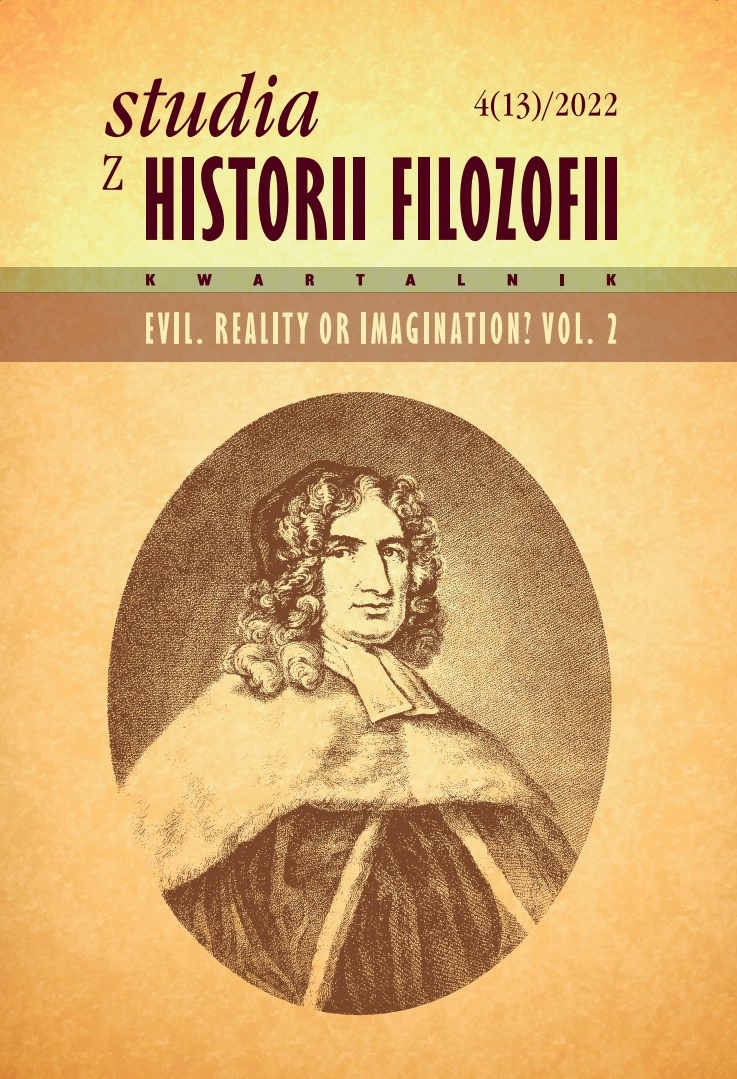Skończoność a zło. W stronę Jeana Naberta
DOI:
https://doi.org/10.12775/szhf.2022.020Abstrakt
Nabertowskie ujęcie relacji „skończoność-zło” jest o tyle intrygujące, że wbrew utrwalonemu w wielowiekowej tradycji poglądowi zakłada, że to skończoność jest uwarunkowana przez zło, a nie odwrotnie. Uzasadniając swój pogląd Nabert prezentuje pogłębioną analizę egzystencjalnych warunków możliwości czynienia zła. Zwraca on uwagę, że pomimo iż mamy poczucie wolnej woli, to okazuje się ono iluzoryczne, gdyż nie jesteśmy w stanie uchwycić źródeł własnych działań. Zdaniem Naberta, niezdolność do ich uchwycenia nie stanowi jednak najbardziej pierwotnego warunku możliwości czynienia zła. Warunku tego należy poszukiwać bowiem w konstytuującym naszą egzystencję źródłowym rozdźwięku, zachodzącym między „Ja empirycznym” a „Ja czystym”, czyli w „alienacji fundamentalnej” Wszelkie cechujące nas ograniczenia są wtórne wobec zła generowanego poprzez ten rozdźwięk, w tym właśnie sensie zło poprzedza skończoność. Aby podważyć wskazany wyżej prymat zła nad skończonością, trzeba by rozszerzyć znaczenie pojęcia skończoności uznając, że sama alienacja fundamentalna również może być kwalifikowana jako skończoność. Nawet jednak w takim przypadku pozostałaby do rozstrzygnięcia kwestia specyficznego typu zła (wskazywanego przez Naberta w dziele Le Désir de Dieu) polegającego na odmowie podejmowania wysiłku przezwyciężenia alienacji fundamentalnej. Odmowa taka może być wszakże odczytywana jako czynnik nie tylko potęgujący tę alienację, ale w ostatecznym rozrachunku jako czynnik warunkujący ją.
Bibliografia
Descartes René. 1958. Medytacje o filozofii pierwszej wraz z zarzutami sławnych mężów i odpowiedziami autora oraz rozmowa z Burmanem, t. 1, przeł. Maria Ajdukiewicz, Kazimierz Ajdukiewicz, Izydora Dąmbska. Warszawa: PWN.
Dastur Françoise. 2009 „La question philosophique de la finitude”. Cahiers de Gestaltthérapie 23(1): 7–16.
Kant Immanuel. 1993. Religia w obrębie samego rozumu, przeł. Andrzej Bobko. Kraków: Wydawnictwo Znak.
Levert Paule. 1971. Jean Nabert ou l’exigence absolue. Paris: Éditions Seghers.
Mukoid Ewa. 1999. Filozofia zła: Nabert, Marcel, Ricoeur. Kraków: Universitas.
Nabert Jean. 1943. Éléments pour une éthique. Paris: Aubier Éditions Montaigne.
Nabert Jean. 1955. Essai sur le mal. Paris: Aubier Éditions Montaigne.
Nabert Jean. 1994. L’expérience intérieure de la liberté et autres essais de philosophie morale. Paris: Presses Universitaires de France.
Nabert Jean. 1994. Le Désir de Dieu. Paris: Les Éditions du Cerf.
Naulin Paul. 1980. Le problème de Dieu dans la philosophie de Jean Nabert (1881–1960). Clermont-Ferrand: Association des Publications de la Faculté des Lettres de Clermont.
Ricoeur Paul. 1999. „L’Essai sur le mal”. W: Paul Ricoeur, Lectures 2. La contrée des philosophes, 237–252. Paris: Éditions du Seuil.
Robilliard Stéphane, Frédéric Worms. 2010. Jean Nabert, l’affirmation éthique. Paris: Beauchesne.
Udaga Dieudonné. 2014. La subjectivité à l’épreuve du mal. Réfléchir avec Jean Nabert à une philosophie de l’intériorité. Paris: L’Harmattan.
Zuziak Władysław. 1998. Dojrzewanie świadomości refleksyjnej w filozofii moralnej Georgesa Bastide’a i Jeana Naberta. Kraków: Wydawnictwo Naukowe Papieskiej Akademii Teologicznej.
Pobrania
Opublikowane
Jak cytować
Numer
Dział
Licencja

Utwór dostępny jest na licencji Creative Commons Uznanie autorstwa – Bez utworów zależnych 4.0 Międzynarodowe.
Statystyki
Liczba wyświetleń i pobrań: 715
Liczba cytowań: 0



